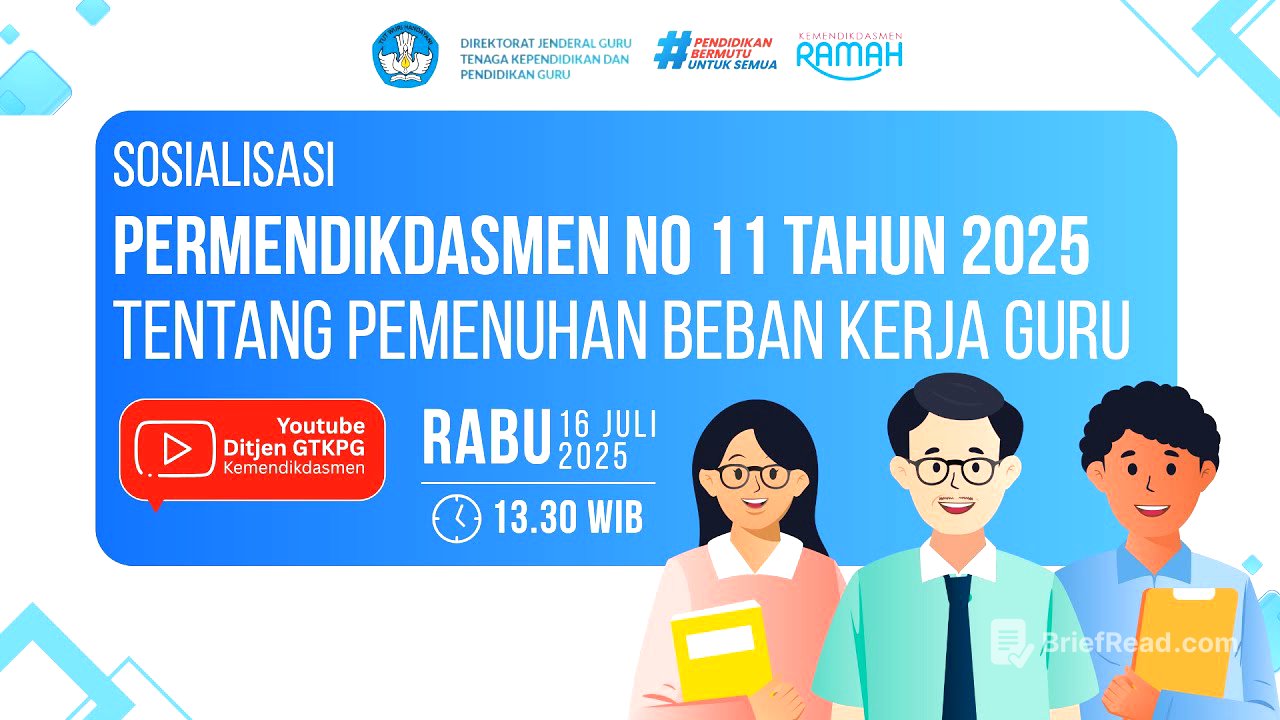TLDR;
This video is a socialization event for the Minister of Education and Culture Regulation Number 11 of 2025, which concerns fulfilling teachers' workloads. The speakers discuss the background, objectives, and key changes in the new regulation, including additional tasks for teachers, the role of homeroom teachers, and the fulfillment of workload within the base administrative unit. The event aims to provide stakeholders with a common understanding of the regulations for proper implementation.
- The new regulation aims to improve the quality of learning, character education, and the development of students' potential and interests.
- Key changes include additional tasks for teachers, a new nomenclature for homeroom teachers, and the fulfillment of workload within the base administrative unit.
- The goal is to ensure that every policy established can be fully understood and implemented by stakeholders.
Introduction [2:43]
The host, Sinta Dewi Kumor, opens the socialization event for the Minister of Education and Culture Regulation Number 11 of 2025, focusing on the fulfillment of teachers' workload. The event includes greetings to the Director General of Teachers, Education Personnel and Teacher Education, Mrs. Nunuk Suryani, and other distinguished guests. The agenda includes singing the national anthem and listening to activity reports and speeches.
Activity Report [6:50]
Mr. Putra Asga Alefri, Director of Secondary Education and Special Education Teachers, presents a report on the preparation and implementation of the socialization of teacher workload regulations. He emphasizes the collaborative effort within the Directorate General of GTKPG in formulating policies related to teachers and educators. The process involves preparing academic papers, conducting public tests, harmonizing with related ministries, and finally, socialization after official publication. The socialization aims to provide information to stakeholders for a common understanding and appropriate implementation.
Welcoming Speech and Opening of the Event [13:08]
Mrs. Nunuk Suryani, Director General of Teachers and Education Personnel and Teacher Education, delivers a welcoming speech and officially opens the socialization event. She highlights the focus on improving the quality of learning, character education, and developing students' potential. Adaptive policy alignment is needed to support these steps, including regulating and fulfilling teacher workloads. The new policies include the addition of other types of additional tasks for teachers, a new nomenclature for homeroom teachers, and the ability for teachers to be assigned to another school if needed.
Material Presentation [19:58]
Mr. Temu Ismail, Secretary of the Directorate General of Education Personnel and Teacher Education, presents the material regarding Permendikdasmen number 11 of 2025 concerning the fulfillment of teacher workload. He discusses the spirit of transformation in relation to education policy, focusing on improving the quality of character education learning and development with the talents and interests of students. The regulation is one of the mandates of the law on teachers and lecturers, which is related to teachers having a workload, duties, and functions both within and outside the school.
Background and Legal Basis [24:23]
Mr. Ismail explains the legal basis for the regulation, starting from the mandate of Article 17 paragraph 3 of the 1945 Constitution of the Republic of Indonesia, Law Number 14 of 2005, and its derivative regulations. He mentions previous regulations, such as Permendikbud number 15 of 2018, and explains how the new regulation builds upon and changes existing policies. The changes are based on input from the field and analysis of additional tasks carried out by teachers.
Key Components of Teacher Workload [30:43]
Mr. Ismail details the components of a teacher's workload, including planning learning or guidance (M1), implementing learning or guidance (M2), assessing learning or mentoring outcomes (M3), guiding and training students (M4), and carrying out additional tasks (M5). He explains that teachers have working hours that follow the ASN Law, namely 37.5 hours per week, and a workload that requires a minimum of 24 hours of face-to-face teaching.
Guiding and Training Students & Homeroom Teachers [35:14]
Mr. Ismail elaborates on guiding and training students, including carrying out duties as homeroom teachers. He explains that homeroom teachers provide academic support, develop skills competencies, and character of the students they supervise. The homeroom teacher is required for subject teachers at the junior high school level and above.
Additional Tasks for Teachers [39:45]
Mr. Ismail discusses additional tasks for teachers, including being the deputy head of the educational unit, head of the educational unit's expertise program, head of the educational unit's library, and others. He also mentions other additional tasks, such as being a homeroom teacher, inter-school student organization supervisor, extracurricular supervisor, and more. He notes that some of the nomenclature has changed, such as the project-based learning coordinator.
Implementation and Equivalence [45:06]
Mr. Ismail explains that teachers can be assigned to other educational units under certain conditions. He details how to obtain equivalence for the workload, including the magnitude of the equivalence or recognition for face-to-face workload. The implementation of learning and guidance requires at least 24 hours of face-to-face meetings per week and a maximum of 40 hours per week. He also discusses the equivalence for homeroom teachers and other additional tasks.
Exceptions and Competency Development [53:39]
Mr. Ismail discusses exceptions to the minimum 24 hours of face-to-face meetings, such as when teachers cannot fulfill the requirement based on the curriculum structure. He also includes the connection with the development of teacher competencies, principals, and existing teachers. Competency development activities can be carried out outside or inside the base administrative unit.
Transition and Closing [58:21]
Mr. Ismail addresses the transition period, stating that school supervisors will continue to fulfill their workload in accordance with previous regulations until their status is adjusted. He notes that the Regulation of the Minister of Education and Culture Number 15 of 2018 and its amendment have been revoked. The implementation of the new regulation will be valid for the 2025-2026 academic year. He provides illustrations of the equivalence for various tasks, such as homeroom teachers and OSIS advisors.
Question and Answer Session [1:07:18]
The session addresses various questions from participants regarding the implementation of the new regulations. Topics include dividing hours between teachers, providing JJP to Serdik teachers with additional duties, the role of homeroom teachers, collaboration between guidance counselors and homeroom teachers, and more. Mr. Temu Ismail provides detailed answers and clarifications to each question.
Closing Message and Reinforcement [1:32:02]
Mr. Temu Ismail delivers a closing message, urging the Education Office to convey the new regulations to educational units and professional organizations. He emphasizes the importance of discussing the new regulations and adjusting tasks for the existing fields or subjects. He hopes that the new regulations will provide more flexibility in fulfilling the teacher's workload and that all teachers will receive their rights and provide the best service for students.








